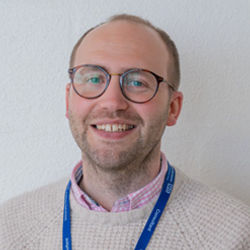
Sean Main
Neuro-oncology
Dr Sean Main is a Consultant Clinical Oncologist at University Hospital Southampton (UHS) and part of the Research Leaders Programme (RLP).
His research focuses on improving care for adults with high-grade brain tumours.
Improving patients’ survival
Around 200 people come to UHS from across Wessex each year for brain tumour surgery for a high-grade brain tumour.
Many patients with a brain tumour may require further treatments, such as radiotherapy or chemotherapy. It is at this point that Sean gets involved in their care.
Patients who have high-grade brain tumours – the most severe type – currently only have an average life expectancy of one to two years from their diagnosis.
High-grade brain tumours mainly affect older people. However, Sean says that across all cancers, brain tumours are one of the biggest killers for those under the age of 40.
“The prognosis for these patients remains poor,” he says. “The treatments have not really changed over the past 20 to 30 years. There have been multiple negative clinical studies.”
There are not many opportunities right now for these patients to take part in research at UHS.
“Currently, there are not many opportunities for brain tumour clinical trials in Southampton,” says Sean. “However, with the clinical expertise here and good national collaboration we may be able to contribute to brain tumour innovation.”
Sean is therefore keen to find new treatments that could help to give his patients more time. He intends to do this by expanding the number of brain cancer trails and studies at UHS.
This will provide more opportunities for patients with brain tumours to take part in research in Southampton. It could also give patients access to new treatments being developed that might improve their quality of life or extend their lifespan.
“My goal is to improve survival, and also to improve good quality survival,” says Sean.
Getting the research ‘bug’
In September 2024, Sean finished a clinical and research fellowship, where he worked as the inaugural Tessa Jowell Brain Cancer Mission Fellow with researchers at King’s College London and Guy's and St Thomas' NHS Foundation Trust.
During the fellowship, he did research into the role of the microbiome in determining how well brain tumour patients responded to treatments.
The microbiome is the complete set of bacteria and other microorganisms that naturally live in an organ system. This includes the gut, but he is also interested to explore a brain microbiome, with bacteria or bacterial products occurring naturally in and around the tumour in the brain.
He found evidence that may suggest the microbiome in the gut, the brain or both could influence treatment efficacy.
“In those who were given broad-spectrum antibiotics during chemoradiotherapy treatment for glioblastoma, we have seen that treatment may be less effective,” he says.
Sean’s fellowship gave him his first real taste of being a researcher. Since then, he’s become a consultant. This meant he had less time for research, but he really wanted to continue with it.
“I got the bug, I think,” he says. “It’s just very stimulating and rewarding to try and think about some of these questions, and to have time to do that.”
Now, Sean’s RLP award has given him just that – the time to focus on his research. One of the ways he’s using it is to build on the discoveries he’s made during his fellowship.
He will start to analyse for bacteria or bacterial DNA in samples from brain tumour patients. He intends to see how the bacteria he finds in these samples relate to the patients’ outcomes. It’s just the start.
“If there are associations between the gut microbiome and treatment efficacy it may be possible to influence this to improve patient outcomes,” he explains. “In addition, if we discover a brain tumour-associated microbiome then this will change our understanding of brain tumours.”
As well as Sean’s work on the microbiome and expanding the number of brain cancer studies and trials in Southampton, he hopes to explore other promising treatments. This includes clinical studies using such treatments as immunotherapy and precision medicine - where treatments are given to a patient based on the genome of the tumour.
It’s clear to Sean that this research is needed to investigate new options for these patients.
“We can’t just rely on current treatments of chemotherapy and radiotherapy, we need to consider other approaches to manage brain tumours,” he says. “We need to think outside the box.”
